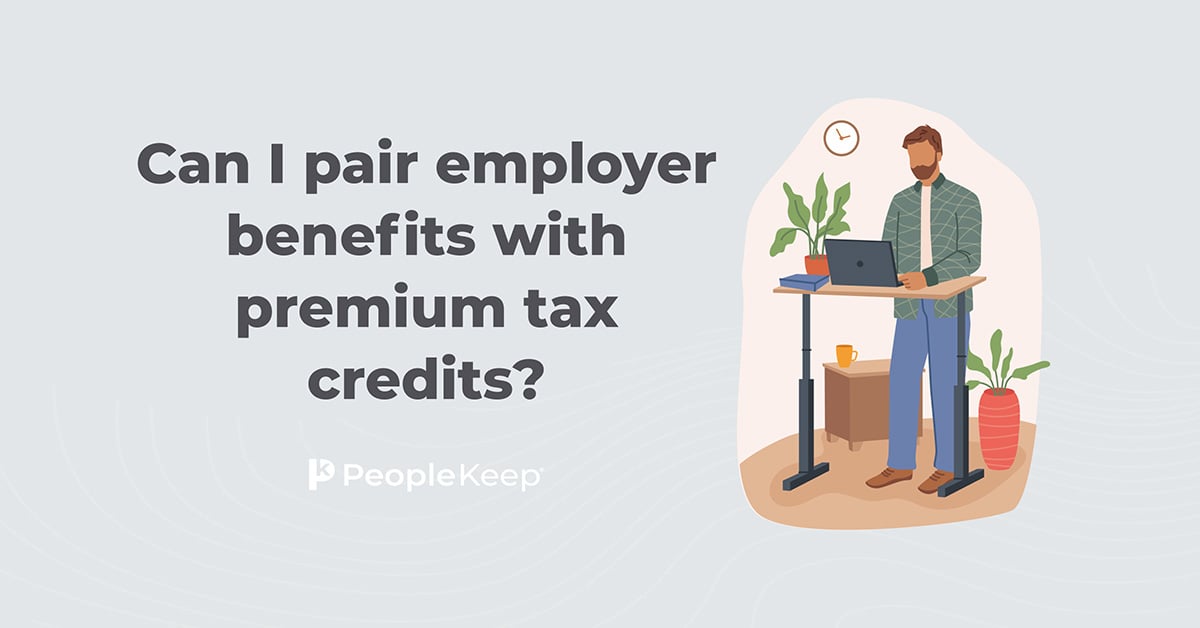The top 3 health benefit options for small businesses with one employee
By Elizabeth Walker on December 20, 2024 at 10:45 AM
There are 31 million entrepreneurs in the U.S.1 While it’s exciting to start your own business, it can be challenging—especially if you’re trying to grow from a one-person team to a business with employees. One obstacle you may face is attracting and retaining employees. Before making your first hire, you must build a compensation package with a health benefit your employee will appreciate.
Many employers considering a health benefit for the first time first look to traditional group health insurance. But it can be too costly for small business owners. Insurance carriers can also have strict participation requirements that not all employers can meet.
Because of these challenges, you may think you can’t offer a health benefit if you run a small business with one employee. Luckily, this isn’t the case.
In this blog post, you’ll learn:
- The options small employers have when it comes to health benefits—including alternatives to group plans.
- The advantages of health reimbursement arrangements (HRAs) for small business owners.
- How taxable health stipends can work for small employers and cover employee healthcare costs.
1. Small group health insurance
Many employers think group health insurance is only for larger companies with several employees. But businesses with one employee can still qualify for a traditional group health plan, depending on how their state defines a “group.”
Here’s a snapshot of how group health insurance works for small business owners:
- If the business has an owner and an employee (making a “group” of two), they’re eligible for a small group health plan in all states.
- Employers can shop for small group plans through a private health exchange that is set up by an insurance company, licensed agent, or broker. You can also buy a plan on a public exchange, like the Small Business Health Options (SHOP) marketplace. SHOP plans are only available in some states and have eligibility requirements that employers must meet.
- If you buy a plan on the SHOP marketplace, you may qualify for the small business health care tax credit to make your premiums more affordable.
- As with large group plans, eligible employers pay a fixed premium rate for the policy. The employee pays the plan’s copay, coinsurance, and deductible amounts. They may also also pay a portion of the monthly premium cost.
- Are you the owner and only employee of your business? While you won’t be able to get a group plan in most states, you can enroll in an individual health plan.
About 154 million people have employer-sponsored group health insurance2. Many employees already know how it works, making the familiarity reassuring. But just because group plans are a common health insurance option doesn’t mean they’re the best choice for small businesses.
Group health insurance can have higher premiums and administrative costs than other options. It’s also a “one-size-fits-all” plan, which can leave current employees unhappy with their health plan coverage. This can cause talented workers to leave your organization for a company with better employee benefits, leading to costly turnover.
Budget management and flexibility are critical factors when choosing a comprehensive health benefit. Small employers should look past traditional options and consider alternatives to group health insurance to make an informed decision for their organization.
2. Health reimbursement arrangements (HRAs)
Instead of a group plan, you can consider a stand-alone health reimbursement arrangement (HRA). An HRA is an employer-funded health benefit that reimburses employees tax-free for their individual health insurance premiums and qualified out-of-pocket medical expenses.
With an HRA, you set a monthly allowance amount that your employees can spend on medical care, including health insurance policies. Once employees make an approved purchase, you reimburse them tax-free up to their allowance limit.
The following are a few ways HRAs benefit small businesses:
- HRAs are employer-owned. Any unused funds stay with you if an employee leaves your company.
- You don’t have to pre-fund an account. You only pay your employees after they make an eligible purchase. You keep any unused funds at the end of the year.
- They don’t have minimum contribution limits.
- They don’t have annual rate increases or minimum participation requirements.
- They allow your employees to choose the individual plan that works best for them.
- HRAs come with tax benefits. All reimbursements are free of payroll taxes for employers and income-tax-free for employees.
In the sections below, we’ll highlight two HRAs available to businesses with one eligible employee: the qualified small employer HRA (QSEHRA) and the individual coverage HRA (ICHRA).
Qualified small employer HRA (QSEHRA)
A QSEHRA is for small businesses with fewer than 50 full-time equivalent employees (FTEs). As long as you have at least one W-2 employee, you can offer a QSEHRA.
Here’s a snapshot of how the QSEHRA works for small businesses:
- The QSEHRA has annual maximum contribution limits that the IRS sets annually. For greater flexibility, you can customize monthly allowances based on age and family status.
- As your business grows, you must offer the QSEHRA to all full-time W-2 employees. You can extend the benefit to part-time staff members. But they must receive the same allowance as your full-time employees.
- There are also eligibility rules for business owners. C-corp owners can participate in a QSEHRA. But sole proprietors, partners, and S-corp owners aren’t eligible.
- Monthly premiums and out-of-pocket medical expenses are eligible for reimbursement with a QSEHRA. However, you can design the benefit to reimburse for health insurance plan premiums only.
- Employees must have a health plan that meets minimum essential coverage (MEC) to participate in the benefit. MEC includes individual health insurance, Medicare, Medicaid, and coverage through a parent’s or spouse’s group health plan.
- If employees have coverage through a healthcare sharing ministry, they won’t be able to participate.
Lastly, if your employee is eligible for premium tax credits, they can collect them if their QSEHRA allowance is unaffordable. But, their allowance amount will reduce their subsidy.
Individual coverage HRA (ICHRA)
Businesses of all sizes can offer the ICHRA. Like the QSEHRA, you can offer the ICHRA as long as you have at least one W-2 employee. It also reimburses your employees for their individual health insurance premiums and qualified medical expenses. However, it has different features than the QSEHRA.
Here’s a snapshot of how the ICHRA works for small businesses:
- The ICHRA is for businesses of all sizes and has no maximum contribution limits. This makes it the perfect option if you want to grow your staff substantially. It’s also a better option than the QSEHRA if you want to offer a greater benefits allowance to each employee.
- You can vary eligibility and allowance amounts by employee classes, such as hourly or salaried, for greater personalization.
- Only employees with a qualifying form of individual health coverage can participate in the benefit.
- If your employees only have coverage through their spouse’s group health plan, they won’t be able to participate.
Like the QSEHRA, how premium tax credits and ICHRAs work together depends on affordability. If the ICHRA is affordable, participants must waive their credits to opt into the benefit. If it's not affordable, they can opt out of the ICHRA and continue receiving their credits.
3. Health stipend
If you want something less formal than a group plan or an HRA, you can offer a health insurance stipend. Health stipends are a fixed amount of money employers offer their employees to cover the cost of their health insurance premiums and a wide range of other out-of-pocket expenses.
Stipends have fewer compliance regulations than other health benefits. So, they’re often easier for small employers to administer.
Here’s a snapshot of how health stipends work for small business owners:
- Stipends have no minimum or maximum contribution limits. So, you can give your staff as much money, or allowance, as your budget allows.
- You can offer a stipend as a one-time bonus or as regular payments. But you can also use a reimbursement model. In this case, you only reimburse your employees after they incur an eligible health expense.
- Stipends are flexible enough to meet the needs of every diverse workforce. Employees can spend their stipend money on the healthcare items and services that work best for them, improving job satisfaction.
- Any type of worker is eligible to receive a stipend. For example, if your sole employee is a 1099 contractor or international worker, you can offer them a stipend the same as a full-time or U.S. employee.
- Employees with premium tax credits can receive their full stipend amount without impacting their subsidy eligibility.
However, stipends do have a few potential downsides. The IRS considers stipends taxable income for the employee, and employers must pay payroll taxes on reimbursements. Stipends also don't satisfy the Affordable Care Act's employer mandate. Employers with 50 or more FTEs must offer a group plan or an ICHRA to comply with federal law. So, it may not be your best option in the long term if you plan on growing your business.
Lastly, you can’t legally require your employees to use their allowance for health expenses or request they submit a receipt for individual plan premiums, medical services, or prescriptions. So, there is a possibility they may use the stipend on something else.
Conclusion
Comprehensive health insurance coverage is among the best investments a business owner can make. But for many small employers, the cost of group health insurance and dealing with complex compliance regulations aren’t worth it. Luckily, HRAs and stipends make it easy for business owners to provide affordable health benefits their employees will love.
If you’re ready to choose an HRA or health stipend for your first employee, PeopleKeep is here to help! With our health benefits administration software, you can manage your health benefit in minutes per month. Book a call with us today, and we’ll get your small business set up with the right HRA or health stipend for you.
This article was originally published on February 14, 2019. It was last updated on December 20, 2024.
Check out more resources
See these related articles

Health insurance options for pastors and clergy
Are you a minister or church looking for health insurance options? Explore our guide to find the best health insurance plans for pastors and clergy.

What is a health insurance subsidy?
Discover the ins and outs of health insurance subsidies with this comprehensive overview. Learn how they can help make healthcare more affordable for you.

Can I pair employer benefits with premium tax credits?
Discover if you can combine employer benefits with premium tax credits when it comes to health insurance. Get all the answers in this informative post.



